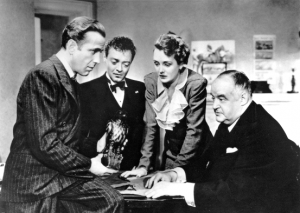 “Why do you bother with the follow-up material in some of your elevator pitches? An elevator pitch is supposed to be succinct and easy to take in quickly.”
“Why do you bother with the follow-up material in some of your elevator pitches? An elevator pitch is supposed to be succinct and easy to take in quickly.”
Well, because elevator pitches alone are worthless, really. Elevator pitches, plot summaries, high-concept narratives, all of these conventional keys-through-the-gateways of publishing and Hollywood? They’re total bullshit measures of the worth (and success potential) of a story.
Think of how many celebrated television series struggled through their first few seasons, or dropped off significantly in their last few. Consider Dexter. The premise of the show remained the same throughout:
A serial killer, with a code that allows him only to kill other killers, works as a blood-spatter analyst for a metropolitan police force. He struggles with his code (and his dark urges) as he tries to negotiate some semblance of a normal life.
The elevator pitch version of the show didn’t change in the much-despised final seasons, but the quality of the writing did. And what do I mean about the quality of the writing? The quality of the personality interactions, including dialogue and relationship dynamics. These became stretched and/or stale, perfunctory, as if the writers were simply marching toward the sensational ending.
Had the show started with this crap writing, it wouldn’t have been picked up for a second season. And, with better writing, the finale of Dexter might actually have made sense and carried the emotional weight of self-sacrifice the writers clearly intended.
(On a side note, I got the same feeling from the “Purple Wedding” episode of Game of Thrones: just pushing forward to the climax with some of the stalest dialogue and weakest characterization in the series, the singular exception being Tyrion’s rather clever and articulate suggestion that the king fight the actors himself. Let’s hope the writing improves as the series moves forward.)
The premise of a story is what the story is about, but it’s not the story. The story itself is the interaction of personalities. And, I use “personalities” here instead of “people” or “characters” because the personalities can include aspects of story not normally thought of as characters, like settings or objects. Who can deny that the One Ring has a personality dynamic with the characters in Tolkien’s story? And, doesn’t the city itself have a personal presence in most hardboiled urban fiction?
_
Premise = Genre = MacGuffin

Personality interaction and, incidentally, a bird.
If the personality interaction is the real story, then the high concept, the premise, the elevator pitch is just a MacGuffin.
A MacGuffin (per the all-powerful Wiktionary) is “a plot element or other device used to catch the audience’s attention and maintain suspense, but whose exact nature has fairly little influence over the storyline.” This is why the One Ring is not a true MacGuffin, but the Maltese Falcon is. So is pretty much everything Indiana Jones goes hunting for.
Since a MacGuffin is an element inside a story, it might perhaps be more accurate to describe the premise as a meta-MacGuffin, but the basic idea is the same: it’s just a hook used to pull the real story along.
In fact, the internal MacGuffin is usually the cornerstone of the overarching MacGuffin. Imagine an elevator pitch for The Maltese Falcon. Anything you come up with centers on that little statue, doesn’t it? The internal MacGuffin is like the avatar, the material incarnation of the premise MacGuffin, the material manifestation of its Platonic form in narrative time.
But, it’s not the real story.
The fact that the story premise is merely a MacGuffin is why the solemn delusion of so-called “literary fiction” is so offensive to literature when it sets modern realist fiction against what is summarily dismissed as “genre.” The idea that the realistic tone and setting of a story makes it superior to other stories is a ridiculous, ignorant, supremacist fetish. These aspects of the story are part of its concept, its premise, its elevator pitch, and therefore its MacGuffin. Modern realism is just another genre among many, and genre is MacGuffin.
Which means fans of other types of fiction are not off the hook. Science fiction fans and writers love to think of their genre as especially premise-oriented. Nearly every proposed definition of the genre emphasizes this distinction. But, the exalted self-image of science fiction suffers the same premise-oriented delusion as “literary” fiction. The concept is merely a MacGuffin. The real story is in the personality interaction.
Don’t think so? Consider what many consider the Ur-Novel of science fiction, Frankenstein. Now consider the musical play, My Fair Lady. Sit back, lower your defenses, open your mind, and think long and hard. It’s the same story. The reanimated corpses and dialect reform are just MacGuffins that pull us through the same story about personalities interacting and being changed by the interaction. And, since this distinction between the two stories so definitively informs our decision about which genre each falls into, genre itself is also a form of MacGuffin.
The fact that the play is ultimately based on the tale Pygmalion & Galatea and the novel is subtitled The Modern Prometheus, both fantasy stories from Greek myth, seals the indictment.
_
But It’s All Good
This isn’t to denigrate genre or the elevator pitch, just to put them in proper perspective.
Sure, a good high-concept elevator pitch is ultimately meaningless in the power and success of a story. A crap-written tale is going to flop no matter how kewl the premise is, and the lamest concept can work if the writing is good. So, you better have … I hesitate to say “good” writing, because “good” can be interpreted according to prejudice. We need to have more insightful writing, by writers who have a deep understanding of the creative process and a clear theoretical grasp on the interplay between narrative and human psychology.
But, nevertheless, genre is often how we decide which stories to try. People have personal preferences, and these certainly determine whether they’ll take that first bite. Genre is like the flavor of the food we prefer when we take in proteins, carbs, vitamins, and minerals. But the nutrients of the tale still have to be there, and that’s in the writing, the interaction of the personalities, not the genre and its premise. Not in the concept, the elevator pitch. Agents, producers, and publishers who place too much faith in these idols are not doing their professional due diligence.
So, when I come up with an elevator pitch I strongly believe in, I feel compelled to demonstrate that it goes beyond mere high concept. I want to show that the premise can be developed into a real story, with personalities jostling around and growing.
I hope that answers the question.
